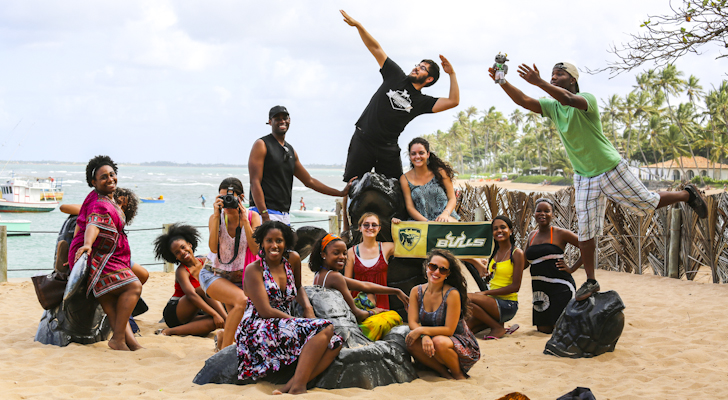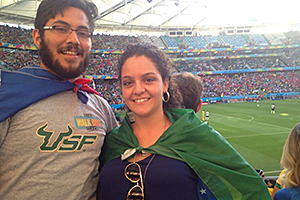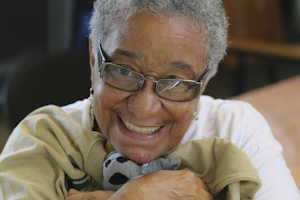
Assistant Professor Elizabeth Hordge-Freeman with students who participated in USF in Brazil. Photo credit: Javier Escudero, Brazil Cultural
TAMPA, Fla. (July 9, 2014) – USF students who went to Brazil this summer had the unique opportunity to observe and be a part of World Cup excitement on top of the usual study abroad experience.
Department of Sociology and the Institute for the Study of Latin America & the Caribbean (ISLAC) Assistant Professor Elizabeth Hordge-Freeman, who leads USF in Brazil, said, “This year several students had a chance to see a ‘friendly game’ between Croatia and Australia, which preceded the official World Cup games and took place in the updated stadium, Fonte Nova. In addition, several of the students were actually able to see several official World Cup games. Katherine Lopez Vasquez, Ariomar Alejo and Javaris Herndon travelled to Recife to see the United States play.”
She and her students had never seen anything like Brazil’s brand of sports enthusiasm.

Katherine Lopez Vasquez and Ariomar Alejo attended the Friday, June 20th game, Switzerland versus France in the Fonte Nova Stadium in Salvador, Bahia, Brazil.
“There was excitement, adrenaline and a level of nationalism through sports that has no equal in the United States,” Hordge-Freeman said. “Even though many Brazilians are disappointed with the way that FIFA has organized the events, and are critical of how billions of Brazilian reais (currency) could have been spent to improve social services, Brazilians were able to set aside their critiques in order to root for the seleção brasileira (Brazilian team). The stadium was beautiful, the metro that had been under construction for over 10 years is actually running, and overall the mood is quite positive and hopeful.”
Elena Dimitri, a dance student from the University of Virginia who participated in the program said, “I noticed a strong sense of community. It felt awesome to watch the Brazil game in Barra Beach with a large crowd of local people. Despite all of the controversies surrounding the World Cup, it felt special to see a large group of people coming together to root for the team. Throughout the night, I felt a sense of unity among strangers and I could really sense the pride that Brazilians have for their country.”
This year’s festive spirit contrasted sharply
with 2013.
“Last year at this time – if people remember – there was significant civil unrest in Brazil and some of the USF in Brazil students saw the protests up close,” Hordge-Freeman said. “However, this summer, there was very little protesting taking place where we were. Although there was a fear that protests might complicate the games, much of that did not materialize.
“The energy in the streets of Brazil is probably the most significant change. Yellow and green banners, small Brazilian flags proudly line every major street. Cars have Brazilian flags flying from their windows and FIFA signs are omnipresent. By early June the streets were packed with tourists from all over the world all here to see the World Cup.”
Enhancing the Learning Experience
In the midst of all the excitement, Hordge-Freeman was focused on enhancing her students’ overall understanding of Brazil, Beyond daily classes there were weekends packed with cultural excursions, musical performances and other activities, but there was more.
“It was important to me to provide a study abroad experience for students that would allow them to be global citizens, rather than simply global tourists,” she said. “In partnership with Brazil Cultural and Instituto Steve Biko, I received a service-learning mini-grant from the Office of Community Engagement at USF, which allowed me to invite several Afro-Brazilian college and high school students to accompany us on all of our cultural excursions. These students are members of the Instituto Steve Biko, one of the largest and oldest civil society organizations focused on achieving racial equality in Brazil.”
The Afro-Brazilian students were language exchange collaborators and accompanied the USF group to cities and locations in the region that many of them had never visited on their own, including the coastal village of Praia do Forte and Cachoiera, an island town in the Paraguaçu River.

Students in front of the famous Elevador Lacerda (Lacerda Elevador), which connects the Lower City of Salvador to the Upper City. It is located in the Historic Center of Salvador and is a major city landmark.
“During their cultural excursions, these students
served as language partners engaging in conversations about the World Cup, the
educational system, Bahia cuisine, and a number of other issues,”
Hordge-Freeman said. “It was an opportunity for them to share a bit about their
culture – speaking in both English and Portuguese – with our students.”
Jeanine Suah, from Orlando and working on her master’s degree in linguistics, said of her language partner, Jessica Batista, that this was “the first time she was actually conversing with native-English speakers so I was grateful that she and the other students were able to experience that.”
A master’s student in Africana Studies, Lisa Armstrong from Tampa, explained that many of the Brazilian students “would never have the opportunity to practice English with native English speakers without this program.” She was told by her language partners that “it is critical for them to learn English if they wish to advance socially and economically.”
The learning went both ways.
“Initially none of our group could understand a word of Portuguese,” Armstrong said. “Now just a few weeks through classes and these constant interactions we understand and speak much more Portuguese.”
Making New Facebook Friends
Bringing a
community engagement focus to the program, Hordge-Freeman gave a talk about her research to
the organization Quilombo Ilha.
“This is a group located on the Island of Itaparica created to help prepare Afro-Brazilian students pass the college entrance exam,” she said. “Because they live on the island, it is rare for these students to have opportunities to interact with students from the U.S. or hear from international researchers working on racial issues in Brazil.”
Hordge-Freeman said that overall, “It was a
wonderful experience that both groups of students enjoyed. Many of the students are now Facebook friends
with one another.”
The USF friends made sure that the USF logo would
become part of the Brazilian landscape.
“Over 100 students attended the talk and the study abroad students passed out USF tee shirts, USF pens, bags, sunglasses, and folders, which had been generously donated by the Office of Community Engagement and ISLAC,” Hordge-Freeman said.

Students got to know Nancy de Souza e Silva, a celebrated researcher and expert on Candomblé dance and oral history at the Pierre Verger Cultural Center and she became quite attached to Rocky. She shared oral histories and stories about the Orixás, which are deities in the Afro-Brazilian religion.
“In addition, as part of service-learning, our students translated portions of a presentation by two capoeiristas (Brazilian dance/martial artists) into English in order to assist the duo with their goal of participating in more international exchanges. The students were so excited about the service-learning activities that we have developed a plan to organize a number of activities – such as movies, presentations and information sessions – as part of ‘Brazil Week.’ We hope to plan this week to coincide with November 20th (Black Consciousness Day) in Brazil."
USF student leader Katherine Lopez-Vasquez, a senior from Miami earning a bachelor’s degree in public health, has decided that her final presentation will be devoted to service-learning in Brazil.
“She began to create a proposal based on student input about how they can continue these activities once they return to USF,” Hordge-Freeman said.
Armstrong observed, “In the program we learned that Africans in Brazil and throughout the Diasporas used religious music to resist, to communicate, establish kinships, pray, give thanks and more. This music continues to do this today. The retention of this portion of the Africans traditions in Brazil is extremely moving.”
Suah found the cultural side
equally compelling.
“From being in the presence of wooden representations of the Orixás (Candomblé gods), to witnessing blatant racial injustice right before my very eyes; this past week’s series of events evoked a number of sentiments that left me speechless, angry, curious, and emotional all at the same time.”
Salvador’s poverty left a deep impression.
“While walking I noticed a little boy who appeared to be about 12 years old sleeping on a cardboard box. I struggled not to cry as we passed him. Only to reach around the corner to find several homeless children sleeping, many of the children are hungry and on drugs,” said Armstrong.
Connecting in Many Ways
The students stayed with local families. Health sciences major Ariomar Alejo, born in San Luis Potosi, Mexico, roomed with fellow student Bernard Dexter Lewis and said of their home-stay, “As soon as we stepped in the door my host mom was very warm and caring towards both of us. I could see it in her way of talking and actions in introducing us to everything. I’m very appreciative of how patient she is because neither of us knew Portuguese yet she helped us using sign language and teaching us a few words every day of basic things we come in contact with, just like a mother would.”
From New Jersey, Michelle Benghtt, who is majoring in international and women’s and gender studies, particularly enjoyed a performance by the Baile Folclórico da Bahia dance company.
“It was a sight to behold and I was enchanted from the first drum beat to the last air flip,” she said. The dancing, “told the stories of millions of Africans brought to Brazil to be enslaved and how they overcame their oppression through their art and culture. It was amazing but more importantly after learning about the history of colonialism in Bahia brought learning to a different level.”
Anthropology major Elizabeth Guidry, from Tampa, found food to be an important part of her experience. “I really like the food they call acai, a fruit that can be blended into a smoothie like texture with bananas and granola bits. I have also had the opportunity to cook American-style pancakes from scratch for my host family."
“Before coming to Brazil I knew close to nothing about its history,” Guidry said. “The longer I am here, the more people I listen to, I realize that Brazil is much more complicated, filled with history and traditions I never knew existed.”
Herndon, from Jacksonville, Florida, and a senior majoring in international studies, was right at home.
“It makes me laugh when they ask if I’m from Brazil. It’s easy for people to think that too, because of the prevalence of Afro-Brazilians. I’ve had multiple people mention that I look like family or someone from Salvador, which is cool,” he said.
The group had five days of orientation on the island. Lewis, from Tampa and a recipient of the Genshaft/Greenbaum Passport Scholarship, noted, “Itaparica represents the duality of those that have and those that do not, which exists throughout Brazil. The past few days I have been able to see and observe the rich culture, inequality, and beautiful people that live here in Itapraica and Salvador.”
He was able to meet a local elected official, Councilman Silvio Humberto.
“It was such an honor to be
able to be in the presence of one of Salvador’s civil rights leaders,” Lewis
said.
Humberto spoke to the group about the state of race relations in Brazil, and his work in improving the lot of Afro-Brazilians including initiatives to hire more Afro-Brazilian civil servants in Salvador which has the largest population of Brazilians of African descent. Lewis said Humberto also successfully launched a campaign to combat police brutality in Pelourinho and Salvador.
“Amidst all of the inequality, it was refreshing to find organizations like Steve Biko, and the hard-working individuals who work with the organization that are constantly working towards making Brazil a more equal democracy.”
Although the entire trip which ended with their return July 2, went well, there were a few hitches after everyone arrived on May 22.
Hordge-Freeman explained, “Unfortunately, many of the major roads and the airport are still under construction although the World Cup games are underway. This upset many Brazilians, as it is a reflection of poor city planning and failure to adhere to World Cup timelines.
“On the students’ first day of school there was a bus strike so this complicated transportation for the students to reach campus. However, the strike was resolved by day two and students were able to take the bus with no problems.”
But then that’s what comes with discovering new worlds and makes studying abroad so enlightening.
“Sensitivity, tolerance, patience and empathy are the keys to experiencing all the wonders of the world,” said Armstrong. “I am so thankful for my experience here in Brazil.”
Barbara Melendez can be reached at 813-974-4563